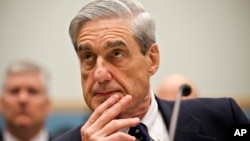The special counsel in the Russia probe has referred investigations into possible unlawful foreign lobbying to federal prosecutors in New York, two people familiar with the inquiry said Wednesday.
Three veteran Washington insiders — Tony Podesta, Gregory Craig and Vin Weber — are under scrutiny for allegedly failing to register as foreign agents with the Justice Department, the people said. None of the three has been charged with any crimes.
Special counsel Robert Mueller turned over the investigations to the U.S. Attorney's office in Manhattan earlier this year, according to the people, who weren't authorized to discuss the case and spoke on condition of anonymity.
The same prosecutors' office is conducting a separate investigation of Michael Cohen, the former personal lawyer for President Donald Trump, at the behest of the special counsel. Like the Cohen case, the lobbying inquiries appeared to fall outside the scope of Mueller's probe of Russian meddling in the 2016 presidential election.
Prosecutors and a lawyer for Podesta declined comment Wednesday about the referrals, which were first reported by CNN on Tuesday. Attempts to contact Craig and Weber weren't immediately successful.
The three men in question cover the political spectrum in Washington: Podesta is a longtime Democratic operative whose brother, John Podesta, ran Hillary Clinton's 2016 presidential campaign; Weber is a former Republican congressman from Minnesota; and Craig was a White House counsel for President Barack Obama.
They also all have ties to Paul Manafort, the one-time Trump campaign chairman currently on trial on charges he orchestrated a multimillion-dollar conspiracy to evade U.S. tax and banking laws.
The three did work related to a lobbying effort on behalf of Ukraine's government directed by Manafort and longtime associate Rick Gates, who has pleaded guilty and is expected to testify at Manafort's trial.
Two firms at which Podesta and Weber have held executive positions — the Podesta Group and Mercury Public Affairs — were retained through a nonprofit group in Brussels that was directed by Manafort, according to prosecutors' court filings. Craig oversaw his law firm's report on behalf of Ukraine's government that defended the legitimacy of its prosecution of a former prime minister.
Reports first surfaced in 2016 that Mueller was investigating whether Manafort secretly routed at least $2.2 million in payments to the Podesta Group and Mercury. At the time, the firms claimed they were under no obligation to disclose their activities to federal authorities.
As the scrutiny intensified, Podesta stepped down last year as chairman of his firm; it shut down two weeks later. Craig left his law firm in April.
Under federal law, U.S. lobbyists must declare publicly if they represent foreign leaders or their political parties and provide detailed reports about their actions to the Justice Department. A violation is a felony and can result in up to five years in prison and a fine of up to $250,000.
Mercury said that in deciding it didn't need to register as a foreign agent, it relied on the opinion of its outside lobbying ethics counsel, another Skadden attorney named Kenneth Gross.
Mercury and the Podesta Group both retroactively registered as lobbyists for foreign interests in 2017 after they first came under scrutiny.
Though prosecutors' court filings in the Manafort case state both the Podesta Group and Mercury worked with Manafort, the firms have taken different — and sometimes contradictory — stances in public.
In a 2016 interview with the AP, Tony Podesta acknowledged that Manafort's firm had been involved with the Ukraine lobbying work. But Vin Weber and Mercury steadfastly said no such collaboration took place.
"They did not direct our work. We did not work under their direction," Mercury partner Mike McKeon said of Manafort's firm in an April 2017 email to the AP. He added that Manafort had "little involvement" with Mercury's Ukraine work.
McKeon did not respond to phone calls or emailed questions from the AP on Wednesday about whether he and Mercury still stood by those statements, which conflict with allegations in Manafort's October 2017 indictment.
"In fact," prosecutors wrote, Manafort and Gates selected Mercury and the Podesta Group and "engaged in weekly scheduled calls and frequent emails" with the companies "to provide them with directions as to specific lobbying steps that should be taken."




